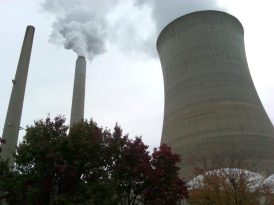WASHINGTON (CNS) — Unborn children would face greater health risks if the Environmental Protection Agency moves to rescind a rule regulating hazardous air pollutants emitted by power plants, said the chairmen of two U.S. Conference of Catholic Bishops’ committees.
The bishops argued in a March 22 statement that the Mercury and Air Toxics Standards, or MATS, are needed to protect pregnant women as well.
“The proposed change to the Mercury and Air Toxics Standards rule is troubling since it is well-documented that pregnant mothers and their unborn children are the most sensitive to mercury pollution and its adverse health effects,” said Archbishop Joseph F. Naumann of Kansas City, Kansas, chairman of the bishops’ Committee on Pro-Life Activities.
Added Bishop Frank J. Dewane of Venice, Florida, chairman of the Committee on Domestic Justice and Human Development, “The MATS rule reflects a proper respect for life of the human person and of God’s creation — a great example of integral ecology called for in ‘Laudato Si’,'” Pope Francis’ encyclical on the environment.

The bishops’ comments coincided with a March 18 letter sent by a USCCB official in response to the publication of the revised EPA rule in the Federal Register Feb. 7.
The EPA said it had concluded that it is not “appropriate and necessary” to regulate hazardous air pollutants from power plans because the cost of doing so “grossly outweighs” the benefits gained by doing so.
Anthony R. Picarello Jr., USCCB associate general secretary and general counsel, opposed the change in a detailed six-page letter, writing that the current standards “align strongly with key principles of Catholic social teaching.”
He expressed concern that although the proposed rule change does not remove power plants from the list of regulated pollution sources under the Clean Air Act, it “greatly weakens legal justification for the rule and could ultimately cause great harm to human health and the environment.”
Picarello said that church teaching “calls us to care of God’s creation and protect the common good and the life and dignity of human persons, especially the poor and vulnerable, from conception until natural death.”
“In short, by failing to take into account the full range of costs, especially those imposed on the most vulnerable, the proposed rule fails to respect the life and dignity of the human person,” Picarello’s letter said as it outlined a series of technical findings on the danger to health posed by mercury and other hazardous air pollutants.
The USCCB supported the standards when they were proposed by President Barack Obama’s administration in 2011 because “even small amounts of these harmful pollutants in the environment are linked to health problems, particularly in children before and after birth, the poor and the elderly,” Picarello’s letter said, quoting from the bishop’s original comment on MATS.
The 180-degree turn by the EPA came in response to a 2015 U.S. Supreme Court decision that found the federal agency erred by not considering cost in determining that broader regulation of power plant air pollutants was necessary.
Writing for the 5-4 majority in the case, then-Associate Justice Antonin Scalia wrote that the EPA must consider costs and that agency officials misinterpreted the Clean Air Act in determining costs were not part of the equation when introducing MATS.






















